There's Profit in Junk
Back to Contents of Issue: February 2004
|
|
|
|
by John Dodd |
|
|
We interview the CEO of Treasure Factory, Eigo Nosaki, a 31-year-old native of Saitama, about how he has been able to build his up-market junk store concept into Japan's third largest recycling chain, with yearly sales of JPY1.8 billion [US$16million].
Can you give us some personal background?
Well, my Dad was a "shosha" man [trading company employee] and I spent my preteen years in Singapore. After I returned, I had to get back into the system in a big hurry, and somewhere along the way, when I was around 13 years old, I decided that I wanted to establish my own company. Then, when I got to university, my thoughts started to jell and I produced a business plan and talked to various mentors.
Then I interned for a year at a marketing research company in Tokyo. This was in the bubble period in the early 90s and they had been funded to go out and test products and ideas on university students. I learned a lot there. So by the time I was ready to graduate, I was ready to start a company.
When I was a university student, I had to do some part-time work. One of these jobs was collecting old furniture and other trash for a junkyard. I was amazed at how Japanese throw away things which are still usable and which others would pay money for. In those days recycling did exist, but only on a volunteer basis -- so my insight was to do it for a profit. Of course, there were junk shops at that time, but they weren't the sort of place you could take a family. People would kind of skulk in through the back of the place, not wanting others to see them.
What about your initial funding?
Around the time I graduated, in 1995, I saw a newspaper article about a local real estate developer setting up a venture fund, and I wondered if he would be willing to back my first company. I called him, and he very kindly listened to my ideas and agreed to put in some cash. The initial investment wasn't much, about JPY300,000. But thanks to my investor and other angels, the amount started increasing each year that we did business, until we became profitable.
How do you get your finance these days?
Mainly from banks, although we may do a round of mezzanine capital next year.
So you're looking for investors?
Possibly.
After getting the cash, I set up the first store in August, in a warehouse owned by my first investor, the real estate developer, out in Saitama. This was a 2-hour commute for me, given that I was living in Yokohama at the time, and sometimes I slept over at the store. Boy, it gets cold in Saitama in winter! But you've got to do what you've go to do to get started.
How did you get stock in the beginning?
We had no money in the beginning, so every Wednesday, which was trash day, I'd get up at three o'clock in the morning, hop into a borrowed truck and drive around the neighborhood looking for good stuff people had left out on the side of the road for collection. You're not really supposed to do this, but since everything was going to the municipal dump anyway, I thought people wouldn't mind. When I got the goods back to the warehouse, I'd clean them up, fix any broken bits and put them up for sale.
To get customers, I'd call friends and tell them what was available, and invite them in to browse.
I remember one big break came when a 60-year-old man called me and said he was closing down his store and had a whole bunch of new stock and fittings that I could have at a good price. I borrowed another truck and picked everything up. We ran out of storage, so I had to put the boxes in my apartment -- we could barely move around!
Was it hard to find good people once you started other locations?
Typically it should be. But for us, because I'd been in the news so often, young people used to seek me out looking for a job. So we did OK. One good thing about getting great talent coming to you is that you can ask them to do more. For example, my people do their own purchasing [direct from consumers bringing products in] and run the stores in a decentralized management style.
You mean that you allow them to decide how much to pay someone?
Yes. Of course, since they pay in cash, the controls are quite strict, and there is a set manual, online, on how to value each type of product. Everything is overseen by the store manager.
Let's fast forward to today. What does your company look like now?
We have 12 stores in Saitama, Chiba and other bedroom suburbs of Tokyo. Revenues are around JPY1.8 billion for this year, and since we're opening at least one new store a month from now on, we expect the numbers to increase rapidly. A key point in making everything work with this type of growth is to have systems in place.
Well, we may be a junk store chain, but you may be surprised to know that for every product over JPY3,000, we give the inventory a POS code and enter it into our POS database. Not only for POS, this system works well for Internet ordering and Internet sales. It also lets us do some innovative things with the inventory, such as allowing a customer looking for a product in one store to reserve that product from another store in the chain if they have it in stock.
Is the POS system itself secondhand?
[Laughs] No, some things need to be bought new! However, we have developed that software partly in-house -- so we're still working within the spirit of things.
Anything input into the POS system automatically gets written to our Internet database within two hours. So customers have up-to-date access to everything we get in.
What is the format of a typical store?
The average store, which, by the way, is usually a converted warehouse, is about 180 tsubo [approx. 600 sq. meters]. It is staffed by 3 or 4 full-timers and 10 or 12 part-timers. We get about 300 buying customers a week, and they each spend about JPY3,000 to JPY10,000 -- giving us about JPY150 million in revenue per store a year.
We're in the top three. The largest company is probably the franchiser Hard-Off, followed by the franchiser Seikatsu Soko. Then there's us. We're probably the largest operator with our own stores.
Are you thinking about setting up your own franchise operation?
We're thinking about it.
How do you do marketing?
We've tried various things in the media. I've found TV and the Internet are good for us. For example, not so long ago, we ran a TV shopping ad for 30 minutes on a TV shopping channel, and now, even six months later, we're still getting calls based on that campaign.
I've also worked really hard to push the PR side of things. Because of my relatively young age and interesting business sector, I get a lot of interviews from magazines wanting to hear about the venture. People are rather surprised to hear that you can make money from junk in Japan.
Are people's impressions of junk and recycling starting to change? Japan used to be famous as the quintessential consumer-disposal culture.
Yes, but it's taken a while and the negative attitudes in the beginning were one of the main reasons that I came up with the name "Treasure Factory" for the company. These days, people see secondhand goods as an excellent experience to get out for the weekend and browse, a bit like flea markets in Europe. Our point is that one person's junk is another's treasure. So long as the environment in which shoppers can see those goods is acceptable, the concept works.
Well, first of all our cost of goods is flexible, since we typically pay 10 to 20 percent of the price we resell at. If the overall market price falls, then so will the prices we pay to those selling us goods. Secondly, the recycle movement is something like the organic food movement -- it makes people feel good, and they are willing to pay for the experience.
So your real costs are those of staff and premises... Is overstocking inventory a problem?
Surprisingly, we turn over almost all our inventory within six months of receiving it, and on average the turn is around one to one and a half months. Even the furniture sells well. If it's no good, we don't buy it in the first place. By now we have a pretty good idea of what people like and are willing to pay for.
What's the most interesting thing you've ever had to resell?
Well the biggest thing was a showcase for a flower shop. It was huge and we had to rent a special truck to transport it. In the beginning we also used to do used cars, but not any more. But really, we don't deal in weird stuff, just the normal goods that the public would want to buy.
We're looking for the next segment where we can become a recycling leader. For example, although the skill set and selling method are different, we're looking at the business furniture market: desks, chairs, partitions -- that kind of thing. We already have some of these items on our current web site, but it isn't a focus yet. We've also been looking hard at repair shops, furniture refurbishment shops and even a factory to recycle materials. Anything that leverages on our current expertise.
What about more a pawn shop model, with consumer loans?
No, we don't like that format and have no plans to get into that business. We want families to feel good about coming here and browsing. Seeing dad and the kids having fun in one of our stores is what it's all about! @
For further inquiries contact:
Treasure Factory
Foreign Company Alliance Sales
|
|
Note: The function "email this page" is currently not supported for this page.


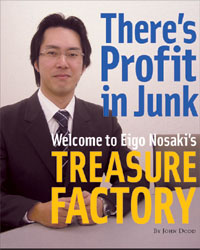 As I walk into the "recycle" shop, essentially a themed junk store, I am hit by the sensation of having walked into a messy version of Crate & Barrel. Lighting is good, the merchandise is laid out in categories and couples are browsing just because it's fun to do. No feelings of depression, desperation or destitution as might be felt in a similar store in Middle America. Indeed, within a few minutes, I find a number of things that I would like to buy, including a beautiful piece of pottery that was an unwanted gift, for the knockdown price of just JPY600... Welcome to the Treasure Factory.
As I walk into the "recycle" shop, essentially a themed junk store, I am hit by the sensation of having walked into a messy version of Crate & Barrel. Lighting is good, the merchandise is laid out in categories and couples are browsing just because it's fun to do. No feelings of depression, desperation or destitution as might be felt in a similar store in Middle America. Indeed, within a few minutes, I find a number of things that I would like to buy, including a beautiful piece of pottery that was an unwanted gift, for the knockdown price of just JPY600... Welcome to the Treasure Factory.
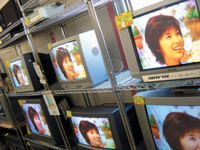 How did you come up with the idea of recycling as a business?
How did you come up with the idea of recycling as a business?
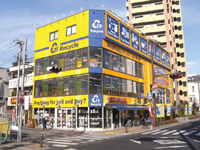 Any memories about the early days?
Any memories about the early days?
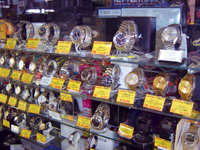 After two years of this, we finally started turning a profit. Then we opened the next store.
After two years of this, we finally started turning a profit. Then we opened the next store.
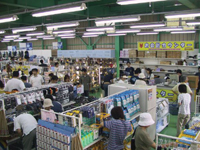 For example?
For example?
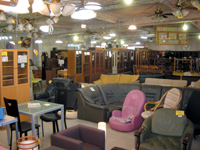 Where do you stand in the recycling marketplace in Japan? What is your ranking?
Where do you stand in the recycling marketplace in Japan? What is your ranking?
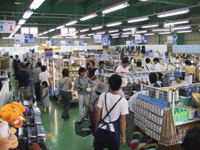 What does the future look like for the recycling sector? Recently deflation has given us some huge price reductions in goods.
What does the future look like for the recycling sector? Recently deflation has given us some huge price reductions in goods.
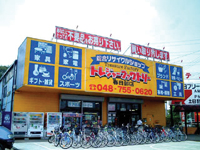 What is next, apart from opening new stores?
What is next, apart from opening new stores?



